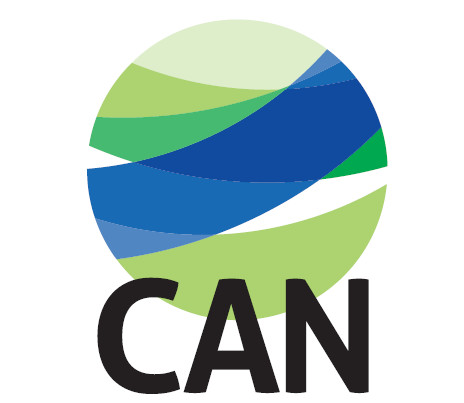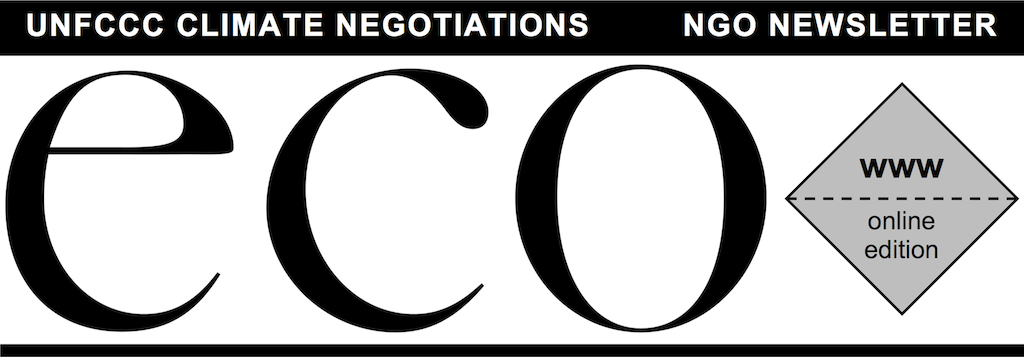Monthly Archive: May 2013
Time For a Timetable
The scope, structure, and design of the 2015 agreement must keep the global temperature increase below 1.5ºC. It must contain national, legally binding targets and actions on mitigation, adaptation and finance to achieve this goal within an overall framework of ambition, accountability and equity.
There has been a lot of discussion here in Bonn on the process and timetable for developing such an agreement by COP21 in 2015. ECO suggests the following: First, countries should agree at COP19 that mitigation action and finance will be evaluated in light of both the collective level of ambition needed to achieve the temperature limitation goal, and on the basis of a set of equity principles that helps assure the overall fairness of country efforts in relation to each other.
The Science Review starting at the next Bonn session will help guide the first part of this evaluation. At COP 19 in Warsaw, Parties need to launch a parallel process to develop an equity reference framework. See the box on page 2 for the details. The key is that equity must become an enabler of increased trust and ambition. It is also critical that, when Parties pledge their targets, they should be aware that their pledges will be reviewed both against the science as well as equity criteria.
... Read more ...
From Bonn to Berlin: Ministers At the Petersberg Dialogue Take Over
When the climate policy train leaves the ADP2 station in Bonn today, it moves on to Berlin at the Petersberg Dialogue. Germany and the next COP host, Poland, will serve as the conductors for this next stop. Three dozen ministers from around the world have been invited to this informal exchange of views to complement the UNFCCC process. ECO is happy to hear that ministers are finally getting together to work on the next steps after Doha. We encourage ministers to put more details to key challenges identified in the past week here in Bonn.
ECO identifies the following tasks for ministers to work on during the Petersberg Dialogue:
1. Make further progress on developing a shared understanding of how to assess individual countries’ contributions to an equitable sharing of the global mitigation effort. This should include discussions on the provision of climate finance to developing countries. A 2015 deal cannot be agreed unless the concerns around equity are resolved.
2. If you are truly serious about the 2°C commitment, you’ll need to re-double your efforts to increase ambition before 2020. Ministers at the Petersberg Dialogue should explicitly recognize that developed countries must increase their woefully inadequate mitigation pledges during 2014.
... Read more ...
Climate Finance In No Man’s Land
The importance of finance to both raising pre-2020 mitigation ambition and getting a successful deal in 2015 cannot be overstated. Right now, climate finance appears to be in no man’s land.
This year should mark the start of a new finance period, given that the Fast Start Finance period ended last year. Instead, we are almost halfway through the year and we’ve seen no new finance commitments beyond the small handful of pledges made in Doha.
This is unacceptable, and ECO thinks that no developed country should be coming back to this process empty handed. Developing countries are facing escalating climate impacts and associated costs. The livelihoods, food security and survival of millions of people are at stake because of a climate crisis they did not create. There can be no justification for holding back on promised finance.
Today’s briefing on the Long Term Finance Work Programme provides delegates with an opportunity to focus on how the process can secure concrete outcomes by COP19. Linking the Work Programme to the COP Ministerial on finance (which crucially must involve finance ministers) is key.
By COP19, we need all developed countries to set out what public climate finance they will provide over the period of 2013-2015 as part of a roadmap for scaling up public finance towards the promised US$100bn per year by 2020.
... Read more ...
The Equity Review
Today, it is widely understood that without a Science Review there would be no real possibility of achieving the ambition required by science. An Equity Review is imminently needed to muster sufficient political will for that needed ambition.
Such a review must be based upon the equity principles that are embodied in the Convention, most notably the principles of ambition, responsibility, capacity and developmental need.
The challenge now is to develop a set of indicators that properly express these principles, and to build them into an Equity Reference Framework. Such a Framework could help Parties to negotiate a set of pledges that are robust and fair enough to yield the breakthrough that we need in Paris.
This is not about a “formula”. Rather, an Equity Reference Framework would be a tool that the Parties – perhaps with a bit of assistance from their friends in civil society – can use to review and improve each other’s proposals in the later part of the political negotiations.
Procedurally, the key is that, when developing their pledges at the national level, Parties would be fully aware of the fact that these pledges will be evaluated against the science as well as the Convention’s equity principles.
... Read more ...
Adaptation Fund: Progressive But Poor!
ECO would like to cast a bright light on whether there is sufficient progress in responding to the needs of the poor and vulnerable at an implementation level. We note that the Adaptation Fund is now established. It has approved funding for 27 adaptation projects with several projects more waiting to be funded. Furthermore, we see that 15 developing countries have already had their National Implementing Entities accredited and can directly access the Fund, and several more countries are in the process of accreditation.
ECO also recognises that the Adaptation Fund has become a forerunner, having recently been ranked as the top climate finance institution by Publish What You Fund: the Global Campaign for Aid Transparency. Just two weeks ago it became the first climate fund in the International Aid Transparency Initiative. It has also been an early-mover in adopting an overarching results framework. The Fund has managed to speed up the project approval process while reducing implementing entities’ fees.
ECO wonders why, with such accomplishments, the Adaptation Fund is the one multilateral fund that has received the least contributions from developed countries in recent years. And to make matters worse, the price for emission reduction certificates (the key income source of the Fund) is now below US$1, largely due to the virtual collapse of the European Emission Trading Scheme.
... Read more ...
Closing the Gap On Aviation and Shipping
This is the year for a fresh start in addressing emissions from aviation and maritime transport – those uniquely international sectors that have generated so much discussion and so little action over the years.
This year, the Assemblies, the highest bodies of both the International Maritime Organization (IMO) and the International Civil Aviation Organization (ICAO) are meeting for the last time before 2015. This will be their chance to make progress on these fast-growing sectors in the pre-2020 period, including by putting a price on emissions from ships and aircraft.
These sectors can make an important contribution to closing the gigatonne gap, both in the period up to 2020 and beyond. These sectors, which account for around 5% of global CO2 emissions, can contribute reductions of up to 0.5 GtCO2e. But perhaps more importantly, decisive progress in addressing these emissions can restore confidence in our multilateral institutions and demonstrate the collective global political will needed to make the transformative steps necessary to prevent a climate disaster.
What’s more, we cannot pass up the chance to use carbon pricing from these sectors as an innovative source of reliable and stable public climate finance for actions in developing countries, and in the sectors themselves, to supplement contributions from the budgets of developed countries.
... Read more ...
ADaPtation Is Important!
ECO listened carefully to yesterday’s roundtable on adaptation. The roundtable discussions brought forward new ideas and thinking on how adaptation can move ahead in the 2015 agreement in a way that adequately addresses escalating climate impacts.
There seems to be consensus that adaptation will be a key pillar of the 2015 UNFCCC agreement. Additionally, many Parties acknowledge that there cannot be a trade-off between mitigation and adaptation, and that without sufficient mitigation, many adaptation efforts will not be enough to cope with mounting impacts, and substantial loss and damage will thus be unavoidable. While these statements are welcome, ECO asks whether Parties will really deliver the required paradigm shift towards climate resilient development.
We are starting to see some “out of the box” thinking, and a recognition that the 2015 agreement provides additional impetus for action. As the delegate from Uganda so eloquently stated, 2015 needs to mark a watershed for implementation – building, strengthening and fully putting into practice the institutions launched in Cancun.
Ideas from delegates included the possibility of a global benchmark or goal for adaptation, as well as the need to stir up action by other international and regional processes on adaptation. The Marshall Islands set out how national legislative action on adaptation could be counted towards developing country commitments under the ADP (ECO of course assumes that these could not be traded against legally-binding mitigation commitments).
... Read more ...
Get Smart About PaperSmart
ECO looks forward to contributing to the success of the Warsaw COP and rejoices at being able to play its part once again contributing to the acuteness of the discussions. Since time immemorial (or maybe it just feels that way), ECO has tried to enrich each negotiating session. We look forward to a PaperSmart conference, but hopefully not so “smart” as to prevent ECO’s opinions and insights from reaching delegates searching for inspiration.
![]()


